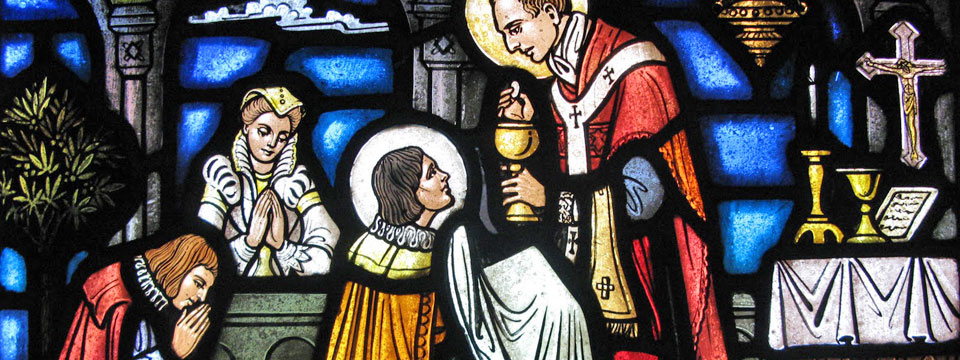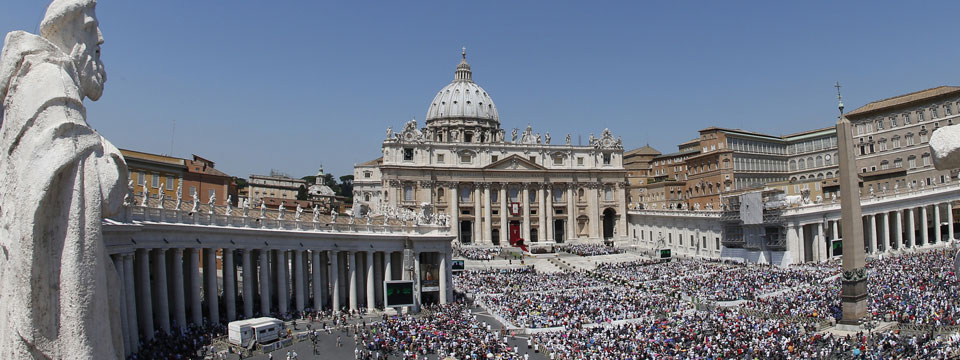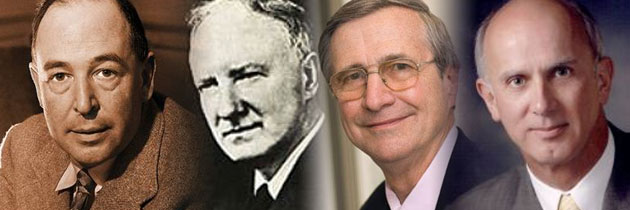- What grace is
- The teaching of the Council of Trent: Decree on Justification
- The Protestant errors regarding grace and justification
- The controversies between the Jesuits and Dominicans in the 16th century and beyond
- A passage by Matthias Scheeben on grace
These articles derive from a paper Fr Peter Joseph tabled at the 2012 ACCC Conference, Grace and Justification: Trent and later controversies.
The definition of grace
The greatness of the gift of grace may be judged from the Biblical declarations of the effect of justification. Justification is a passage from the state of sin to the state of grace; from the old to the new man; from the mere flesh to the life of the spirit; from injustice to justice; from condemnation to liberation; from slavery to freedom; from sordidness to purity; from darkness to light; from death to life. The soul of the just man reflects the very light of the Godhead; it shines with a radiance like that of Christ Himself in His Transfiguration on the mountain.
Justification involves a negative effect and a positive one; and the two always go together: the remission of sin, and the infusion of grace.
Grace is favour or good-will. God’s favour or goodness to us, is God Himself, as all things in God are God. That is Uncreated Grace – which some say was forgotten in the controversies over grace after Trent.
Sanctifying grace. Sanctifying Grace is a supernatural gift of God by which the soul is made pleasing to Him. In Latin it is called gratia gratum faciens: grace making one pleasing – pleasing to God, that is. It removes all stain of serious sin; it gives the soul a new and higher life and prepares the soul for that union with God destined for it in the blessedness of Heaven. It is called Sanctifying Grace, because it sanctifies, makes holy, with the Holiness of God Himself. It is a supernatural gift, because it is something to which no creature as such can ever have any natural right or claim, or attain by its own powers. It is called Habitual Grace, because it dwells and endures in the soul as a habitual, i.e., permanent and constant, quality. It is also called Justifying Grace because by it the sinner is “justified”, i.e., made just or righteous.
Sanctifying Grace, a higher life, a participation in the divinity. The soul of man gives him a three-fold life. It enables him to grow, mature and reproduce, like a plant (vegetative life); to feel and perceive with the five senses, and move and follow instincts, like animals (sensitive life); and to think, reason, understand, contemplate, love and choose freely (intellectual life). But there is still a higher life, a divine life, a life which, by a true and real change, raises man above the natural excellence of the most exalted creatures, and sets him, so to speak, on a level with God Himself; a life which gives us a share in what is special to God Himself, a share in the knowledge God has of His own perfections and in the happiness He derives therefrom. This life is given to us by Sanctifying Grace. The state of grace is not merely the absence of mortal sin; it is a positive acquisition and elevation. “Therefore, if any one is in Christ”, says St Paul, “he is a new creation” (2 Cor 5:17). Scripture uses three participles: re-created, re-born, renewed. St Peter says the Father “has granted to us His precious and very great promises, that through these you may … become partakers of the divine nature.” (2 Pet 1:4). So Sanctifying Grace is also called Divine or Divinising Grace. Some of the Fathers speak of man’s divinisation or deification—as St John of the Cross uses the phrase, “We become God by participation”—which must be understood rightly of course! St John the Apostle says, “we shall be like Him, for we shall see Him as He is” (1 Jn 3:2), and the Church prays at the Offertory of the Mass that “we may be made sharers in the Divinity of Him who deigned to participate in our humanity.”
Sanctifying Grace makes us children of God. A rational creature as such is not a child of God but a servant of God. Through Grace, God adopts us as His sons; and so brothers of Christ. It makes each of us an alter Christus, another Christ. We often use that phrase to speak of the effect of ordination, but in the early Fathers it refers to any Christian.
Sanctifying Grace enthrones the Holy Trinity in our soul. We speak of the Divine Indwelling. The change in the soul caused by Grace is wrought by all Three Divine Persons of the Blessed Trinity, but, being a work of Divine Love, it is ascribed to the Holy Spirit. His presence is incompatible with serious sin, “for”, as the Church prays in the Liturgy, “He is Himself the remission of all sins”—that phrase is in both the old and new Roman Missal.{{1}} The Holy Spirit is the Divine Artist who makes our soul like the soul of Jesus. Making us other Christs, the Holy Spirit takes up His dwelling in our body and soul: “Do you not know that your body is a temple of the Holy Spirit within you?” (1 Cor 6:19). The Father and the Son are with the Holy Spirit in this indwelling: “If anyone loves me”, says Christ, “he will keep My word, and My Father will love him, and We will come to him and make our home with him.” (Jn 14:23)
Sanctifying Grace caused in us by God through the humanity of Christ. God is the principal cause of Grace; Christ as Man is the instrumental cause. His humanity is the instrument of the divinity. He is grace’s transmitter. According to St Thomas,{{2}} the entire humanity of Christ co-operates in the production of Grace. The humanity of Christ is joined to God in inseparable union, and is always used by Him in the production of Sanctifying Grace. – God may or may not employ a Sacrament as a means. He often gives Sanctifying Grace outside the Sacraments: “God has bound salvation to the sacrament of Baptism, but He Himself is not bound by His own sacraments.” (CCC 1257. Cf. St Thomas, Summa Theol., III, q. 64, a. 7: “God did not bind His power to the Sacraments, so as to be unable to bestow the sacramental effect without conferring the Sacrament”.)
With Sanctifying Grace we receive virtues and gifts. These are the necessary concomitants (accompaniments) of grace. They are not grace but always accompany it:
- The divine virtues. With Grace we receive the three Divine Virtues of Faith, Hope and Charity: we believe in God because of His truthfulness; we hope in God because of His power and willingness to help us; we love God because of His own goodness and love.
- The moral virtues. The Moral Virtues are all those other virtues which are necessary for a good Christian life, which may be grouped under the four headings: Prudence, Justice, Temperance and Fortitude. (cf. Wis 8:7)
- The gifts of the Holy Spirit. Just as sanctifying grace makes our souls to be like that of Jesus, the virtues and gifts enable us to act like Jesus. A Christian virtue is a power of acting in a Christ-like way.
Theological points on grace {{3}}
- Sanctifying Grace is a created reality.
Some, such as Peter Lombard (in the Sentences, written 1155-57), held that Grace is the Holy Spirit. This opinion has long been abandoned; St Thomas comments on it to reject it. Uncreated Grace is God Himself, is God’s benevolence toward us; created grace is something distinct. So, as Trent says, it can be increased, and received within us, each according to his own measure, which the Holy Spirit distributes to everyone as He wills.
- Sanctifying Grace is an interior reality.
This is a doctrine opposed to Luther and his followers. Scripture speaks with terms such as seal, gift, seed, charity infused. The Roman Catechism of 1566 expresses it: “Grace is not only that by which the remission of sin occurs, but a divine quality inhering in the soul”.
- Sanctifying Grace is a permanent reality.
Actual Grace is a transient reality but we are speaking of Sanctifying Grace. One of the errors of Baius (Michael de Bay) condemned by Pope Pius V in 1567 was to say that sanctifying grace “consists formally in obedience to the commandments … and not rather in a grace infused into the soul through which man is adopted as a son of God and interiorly renewed”.{{4}} So, for example, we speak of keeping the Baptismal robe unstained until Judgement: because of its enduring quality. Another reason for upholding this enduring quality is that infants are baptized when manifestly they, as yet, receive no grace to do good works. If birth confers a nature and life, then re-birth must similarly communicate something continuous and stable – a new principle of supernatural life.
- Sanctifying Grace is an ontological reality.
We add this to distinguish it again from actual grace or from human actions – since some have said that grace is the moral quality of good acts pleasing to God and conducive to eternal life. If infants receive something from Baptism, then it is not transient, and it is not their morally good actions – of which they are incapable when below the age of reason. Again, to speak, as Trent does, of grace being increased or lost or re-acquired, means it is an ontological reality, not merely a mental or moral concept. The Bible speaks of it as a seed, as light, as water welling up.
Monsignor Antonio Piolanti (1910-2001) teaches “it is a doctrine theologically certain that Grace is a created, internal, permanent and ontological reality.” (p. 533)
Philosophical points on grace
After identifying the concept of grace as it emerges from the teaching of the Church, we can further specify the inner nature of this gift of which we have been speaking, this gift which God bestows upon the soul: that is, the metaphysical essence: whether it be a substance or an accident; and if an accident, to what category it belongs, what is the subject to which it inheres, and whether it is distinct from the soul or charity.
- Sanctifying Grace is not a substance but an accident.
Every reality, in fact, is either a substance or an accident. Grace cannot be an incomplete substance with which the human soul unites to form a being of a different species – as for example, hydrogen is joined to oxygen to form water, which is neither hydrogen nor oxygen. A child, when baptized, remains in the species of human being, but with a difference. Grace cannot be a complete substance. If that were so, grace could not communicate its being to another complete substance, such as man is, but would simply be an efficient agent, and not “inhering” (inhaerens) in the soul as Trent says (ch. 16; canon 11) or “infused” (infunditur: ch. 16). Such terms can be applied only to accidents.
- Sanctifying Grace is a quality.
We can arrive at this by exclusion. Accidents, according to Aristotle, are divided into 9 categories: 1. quantity 2. quality 3. relation 4. time 5. place 6. situation (or posture) 7. action 8. passion 9. dress (or habit or condition).
4 of these 9 are applicable to material bodies only (quantity, place, situation, dress).
3 of them (time, action & passion) relate to movement or change, which is transient, whereas grace is a permanent reality.
That leaves only relation and quality.
Grace cannot simply be a relation, since the Bible and the Church and the Fathers speak of grace as a gift, a virtue, a habit and other terms to indicate something absolute which renews and elevates the soul to the supernatural level. Further, to call grace a relation merely postpones the question, because this new relation needs a foundation in the soul: “It is not a relation, since relation demands a foundation, and sanctifying grace is itself the foundation of the relationship by which we are called children of God and it ordains us to glory, inasmuch as it is the seed of glory.”{{5}}
That leaves one only: quality. Grace is a quality.
What category of quality? Aristotle divides the predicament quality into four species: powers, habitual states (habitus), alterations (passiones), geometrical formations (figurae).
It is not a geometrical figure, for it is not a body.
It is not a passion or passible quality, which is in the sensitive part of the soul; further, a passion is transient – and sanctifying grace is not transient (ruled out earlier).
“Nor is it a … natural power or impotence, because grace is above nature and does not regard good and evil, as does natural power.”{{6}} I think Aquinas’ meaning is that a power may be put to good or evil use: whereas grace cannot be used for an evil purpose.
Aquinas concludes: “Therefore it must be in the first species, which is habit”.{{7}}
- Sanctifying Grace is a habit.
To specify further:
- Habits can be entitative or operative. Entitative habits dispose an individual to be good or bad, while operative habits dispose him to act well or badly. So we say Grace is an entitative habit which disposes the soul in itself, elevating it to the supernatural order, while the operative habits are the virtues: faith, hope and charity, which also being supernatural, dispose the soul to act conformably with its elevated nature.
- Sanctifying Grace is located in the soul.
Grace is not simply in the powers of the soul, but in the soul itself, the essence of the soul. This is affirmed explicitly by St Thomas: “As man in his intellectual power participates in the divine knowledge through the virtue of faith, and in his power of will participates in the divine love through the virtue of charity, so also in the nature of the soul does he participate in the divine nature, after the manner of a likeness, through a certain regeneration or re-creation.”{{8}}
- Sanctifying Grace is really distinct from the soul and its powers, and from charity.
Grace does not destroy nature but perfects it and elevates it. As man has a human nature, so man in a state of grace has a participation in the divine nature; as man has faculties, so a Christian man has infused virtues in his faculties; a man has operations and a reward, so a baptized man has actual graces guiding his operations to perform actions meriting a supernatural reward.{{9}}]
Further philosophical analysis leads to the conclusion, given by Garrigou-Lagrange, that “sanctifying grace is a participation in the divine nature, not only moral but physical, not only virtual but formal; analogical, however, imperfectly imitating as an accident what, in God, is substance.”{{10}}
Good works cannot be performed without Actual Grace. Without a help from God, known as Actual Grace (God’s action upon the soul), the virtues given with Sanctifying Grace will never produce the fruit of good works. Deprived of this help, we should be unable to keep God’s Commandments, and so should lose Sanctifying Grace, which would thus prove a useless gift. So Actual Grace is the due accompaniment of Sanctifying Grace.
The nature of Actual Grace
Actual Grace is a supernatural gift of God, enabling us to do something towards eternal life. It is supernatural, because it is a help towards happiness to which we, as creatures, can have no claim. It is a transient, or passing, aid, and is present in the soul only while the soul is acting. It is like the electric current which, passing for an instant through the wire wound round an iron bar, gives the bar a momentary magnetic power. Sanctifying Grace, on the other hand, is something permanent, and is like the electric power in a storage battery. Sanctifying Grace makes us friends of God, while Actual Grace enables us to act the part of friends.
Actual Grace works on our souls in a twofold manner: (1) it enlightens the understanding, and (2) it strengthens the will and reduces the attractiveness of evil.
Actual Grace helps the sinner and the unbeliever to acquire Sanctifying Grace. The state of Sanctifying Grace is opposed to the state of sin. Both cannot exist in the soul at the same time. One excludes the other, as light excludes darkness. But there is no such opposition between Actual Grace and sinfulness, because Actual Grace is given to the sinner and the unbeliever as well as to the just. It is in fact the very means God uses to draw all erring souls to Him. To the unbeliever, He gives sufficient light to know the truth, and sufficient strength to embrace it; to the sinner, He gives the grace of repentance.
Complete definition of Actual Grace
Actual Grace is a supernatural help from God, which, working within us, enlightens our mind and moves our will to do good and avoid evil for the sake of eternal life. It is a help from God which enables us to perform acts that lead to the acquisition of Sanctifying Grace, or its preservation and increase, or its recovery.
Actual grace is not a habitual quality but a certain motion of the soul – a gratuitous effect of God upon the soul towards something to be known or willed or done.{{11}}
External graces
The grace of which we have been speaking so far is internal grace, so called because it dwells or acts within the soul. All the other helps which God gives us towards heaven are included under the term external grace. Thus, the Incarnation, the Scriptures, and the Church, and Providential things leading us to God, are external graces, because they are not actually present within our soul.
Some remarks on Orthodox teaching on grace
I read a book, Our Orthodox Christian Faith, a little manual of dogma by a Greek Orthodox priest in Athens, translated into English, written in 1973. The author has a chapter headed, “Divine Grace” and in 14 pages he says just as we would say about the effects of grace, and the necessity to have faith and charity and to keep the commandments to be saved. At the same time, he insists on the gratuitousness of grace, and its necessity to make the first step towards God and to be pleasing to Him. He criticises the Protestant error of denying the role of good works. Then in an endnote he adds polemical remarks against the Catholic notion of merit and supererogatory works, and indulgences.
But I notice that, in him, as in other Eastern Orthodox authors, there is no distinction between habitual and actual grace. They pass from talking about one to the other without noticing. They reject scholastic categories when presented to them. For example, a Russian Orthodox monk of recent times, Fr Seraphim Rose, writes: “This [Catholic] idea of supernatural (created) grace is to be distinguished from the Orthodox understanding of grace as the Uncreated Energy of God, through which man participates in God’s life.”{{12}} He then quotes Russian Orthodox theologian Vladimir Lossky: “For Eastern tradition the created supernatural has no existence. That which Western theology calls by the name supernatural signifies for the East Uncreated—the Divine Energies ineffably distinct from the Essence of God.”{{13}} In the book by Fr Seraphim, he quotes the Fathers extensively and calls them “Saint” but he always refers to “Blessed Augustine,” never “Saint”. His explanation of Original Justice and Original Sin are so different from Augustine and Aquinas. He only quotes Aquinas to disagree with him.
[[1]] “… quia ipse est remissio omnium peccatorum”: Roman Missal, 1969: 7th week of Easter, Saturday, Prayer over the Gifts. Missale Romanum, 1962, Postcommunio, Tuesday after Pentecost.[[1]]
[[2]] Summa Theol., III, q. 8, a. 2[[2]]
[[3]] The following paragraphs on theological & philosophical points on grace are summarised from Mons. Antonio Piolanti, Dio nel Mondo e nell’Uomo (2nd ed. Vatican City 1994) pp. 522-43 (espec. 533-9), 570, 774. Reginald Garrigou-Lagrange O.P., Grace – Commentary on the Summa Theologica of St Thomas, Ia IIae, q. 109-14 (Herder, St Louis 1952) pp. 117-24 covers many of the same points in a different order.[[3]]
[[4]] Proposition 42 of Baius condemned in the Bull Ex omnibus afflictionibus: DS 1942[[4]]
[[5]] Garrigou-Lagrange, Grace, p. 117[[5]]
[[6]] St Thomas, Summa, I-II, q. 110, art. 3, obj. 3.[[6]]
[[7]] St Thomas, having said grace is a quality (Summa, I-II, q. 110, art. 2), analyses the four species of quality, and concludes grace is not the same as virtue, as some had said, but belongs to the species of habit: I-II, q. 110, art. 3, obj. 3 & ad 3.[[7]]
[[8]] Summa Theol., I-II, q. 110, art. 4[[8]]
[[9]] Piolanti, p. 774[[9]]
[[10]] Grace, p. 128[[10]]
[[11]]Garrigou-Lagrange, Grace, pp. 117, 119. To be more technical: action, as transitive, producing a correlative passion in the patient, belongs to the category of action, but actual grace belongs to the category of quality, being an immanent action.[[11]]
[[12]] Fr. Seraphim Rose (1934-1982), Genesis, Creation, and Early Man – The Orthodox Christian Vision (2nd ed. 1143 pages, St. Herman of Alaska Brotherhood, California 2011) p. 715[[12]]
[[13]] Quoted in Fr. Seraphim Rose, p. 715, from V. Lossky, Mystical Theology, p. 88. I can follow the first half of the last sentence but I have no idea what Lossky means by “the Divine Energies ineffably distinct from the Essence of God.”[[13]]






